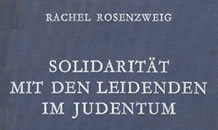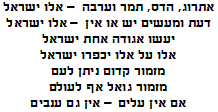| The
Purpose of HEALING - K.I.S.S.
- as stated 12 years ago - was and is
to help me and my potential P E E R s
"to HEAL ourselves into WHOLEness,
and - by extension - all of CREATion!" |
|
I focus my experiencing and awareness on being
"a pioneer of Evolution
in learning to feel":
I let my Body vibrate and my Heart 'womb'
pain, shame, fear, boredom, powerlessness,
so feelings can >heal >guide>fulfill>evolve,
and ~~~ offer ~~~"goldmines"~~~ to us all!!
"I
want you to feel everything, every little thing!"
|
|
Re-edited
on July 24, 2013 ----------- In
this research - first completed 41 years ago -
I cannot update, how the central concept of "SIN" has to be radically
transmuted.
Sin is "Suende" in German, which derives from "sondern"=
to separate.
The actual "Suende" is "Denial", i.e. the separation between
Thinking and Feeling,
i.e. the lack of awareness - by ignoring, overriding, repressing -
of what I do not want in my life - a) feelings, b) needs, c) qualities, d)
greatness.
These denied parts of myself do not simply disappear ,
but survive in body and soul and all around me,
they even attract more of the same denials, become monstrous,
produce evil doing, perpetration, or evil suffering, victimhood.
The redemption from "Sin", i.e. from denial and "Lost Will"-
and from there the redemption from suffering and death,
begins with learning to feel, i.e. to accept, "to womb" what I feel,
to move it physically and then to understand...
In other words: I can allow myself to feel unpleasant feelings, needs, qualities,
only if I KNOW and PRACTISE - that every feeling, from the tiniest to the
biggest -
must be V I B R A T E D , i.e. physically breathed, sounded,
moved,
in order to heal and evolve, and then fulfill its task: to guide me and to
full-fill me.
Once there was a quantum-leap in evolution,
when humans understood that there was a connection between suffering and doing.
Since they knew from the beginning (unlike humankind today), that the many
and the one were tied together,
their "solution" then was, to uproot the one evil-doer from the
community, so as to spare it the consequences.
The next quantum-leap in evolution, was,
when it was understood that this "solution" caused even more suffering,
and they evolved the idea of "reproach and protest".
This, also, caused more damage than benefit.
The "solution" people then came up with, was not an evolution, but
a re-volution:
it was to deny the connection between doing and suffering altogether
and to ignore the mutual guarantorship between the one and the many.
As the present time-period shows, this was/is a horrendous denial,
yes the culmination of an absurd, monstrous illusion.
Now the time has come, to go down to the deepest roots of both:
the connection between doing/notdoing (=denial) and suffering,
and the connection between me, the individual, and everybody else .
 |
My PH.D.-Thesis, 1966-1982, University 1972
Original Theme,1966 : The Idea of VICARIOUS
SUFFERING as an ANSWER to INNOCENT SUFFERING
(i.e. my coping with the holocaust).
Final Hebrew Title 1972: "The PERCEPTION
of SUFFERING and SOLIDARITY
with the SUFFERERS
in the Thought of the Jewish Sages from the time of the second Commonwealth
till the End of the Talmudic Era"
(i.e. in Bible, Apocryphes, Qumran, New Testament, Talmud, Midrash)
|
|
See
the overview of "MY BOOK" in the context of "MY LIFE's
HARVEST"
 |
"All
Israel are Guarantors for Each Other"
Maryam, alias Christa-Rachel Bat-Adam,
married Rachel Rosenzweig, born Eva-Maria-Christa Guth
|
|
| Etrog,
Myrtle, Date, and Willow
-- these are Israel!
Knowing and doing do exist or do not
-- these are Israel!
They shall make one union - Israel!
They will atone for each other -Israel!
An ancient psalm was given to the nation!
A redeeming psalm also for the World!
Without leaves- there won't be grapes!
|
|
|
|
English Summary and Digests
continuation
of Rafael Rosenzweig's translation of the original summary
of the PH.D. thesis delivered to the Jerusalem University on Purim 1972
last update: 2003_04_16
DIGEST - Second Part,
SOLIDARITY WITH THE SUFFERER, Chapters 4-5
II.4
The Emissary's Solidarity with the Community according to the Sages' Judgment
II.5 Identification with the Sinner
II.5.1 Identification of the
emissary with the sinning community
II.5.2 Identification
with the sinner as a characteristic of Israel after the destruction.
II.4
The Emissary's Solidarity with the Community according to the Sages' Judgment
[There is no English equivalent to the Hebrew "Shaliah Zibbur":
"He who is commissioned by the community
to fulfill a special task for it".
Usually the term means the public reader of prayers in the synagogue.
In the Hebrew original I used it for all those persons in Israel
who were conscious of their responsibility towards their people.]
1. Moses
2. Elimelekh
3. Jeremias
4. Ezekiel
5. David
6. R. Yehuda Ha-Nasie
7. R. El'azar ben R. Shimon bar Yohai: The falsification
of his personality
in order to adapt him to the demand of solidarity.
The first consequence
of the teaching of solidarity
is to be realized in the activity of the outstanding personality
and his relationship to the community.
The occurance itself - the outstanding personality, the "emissary"
-
is, in Israel, a result of the feeling of solidarity and of mutual guarantorship.
In this connection it has beeen impossible to do anything but to show,
with a number of examples,
how the solidarity of the outstanding personality did express itself,
or how it should have expressed itself according to the expectations of the
generations.
Moses is
a prototype of a singular and solidary man.
Out of the many tales (Midrashim) about him,
I have selected a number proving
that the base for solidarity of the outstanding personality
is the same as for any other individual:
the dependence upon the community, the need for the community.
On the other hand, Moses exemplifies the evolution
which leads from the feeling of dependence to responsible action:
"This matter,
the rescue of the nation, depends upon myself!"
Elimelekh
as an outstanding personality is especially interesting,
since he is a creature of the imagination of a number of generations of sages.
What are the concrete expressions of the outstanding personality's solidarity?
The totality of expectations shows:
a) he has to remain in the country, with his hungry community,
and may not emigrate in order to save himself.
b) He must support his community.
c) He must ask compassion for his community and must extract it from its sorrow.
d) He must warn the sinners,
"that they may return from their evil ways".
in order to prevent his community from suffering.
Elimelekh's character exemplifies all these expressions of solidarity in a negative
way.
He, Noemi's husband, and the father-in-law of Ruth, the Moabite,
did not fulfill any of these expectations.
But exactly this disappointing imaginary emissary proves
how widespread the expectations of solidarity from the emissary were at the
time.
The prophets Jeremiah
and Ezechiel provided practical proof
for what solidarity of the community's emissary actually means
and what its concrete expressions are;
reproof, warning and protest in order to prevent suffering;
identification, loyalty and solidarity in the time of suffering.
The Bible bears unmistakable evidence regarding the two prophets,
and the sages deepened the understanding and sharpened the definition:
"Wherever Israel sorrows, the righteous live with them
in sorrow!"
The occurance of the community's emissary and of the outstanding personality
did not end when "prophets" ceased.
A prototype for the community's emissary druing the time of the sages themselves
was Rabbi Jehuda Hanasie ( the "President"),
the "father of the Mishna".
It is not by coincidence that he is, usually, simply referred to as "Rabbi".
A good number of incidents showing his solidarity could be related,
but I chose a legend about Rabbi which has been kept alive by tradition.
Legends often give a truer picture of a man than does histsory.
A special significance should be accorded to the legend about Rabbi's sickness,
since, according to it, Rabbi was not solidary to begin with,
but had to learn what solidarity means,
and what identification with mentally and physically suffering beings is.
The commentators and, possibly, Rabbi himself, regarded this as the "subjective"
purpose of his illness.
The objectived aim - the good which Rabbi did to others by taking their place
in suffering -
is based, as a second and logically following phase, on the first one.
Only a man who is subjectively conscious of his solidarity with beings in their
sorrow,
will be capable of objectively keeping sorrow from reaching them.
As shown by "Elimelekh",
not every outstanding personality followed the demand of solidarity.
When the commentators met a historical and influential figure,
who lacked, for one reason or another, the basic solidarity with the community,
and, as a result, lacked also responsibility,
they sometimes chose to falsify the record, in order to settle the man with
the character of an emissary.
Such a falsification did occur already in the Bible, in regard to King
David.
An unknown has done a masterpiece of falsification
in regard to Eliezer, the son of Rabbi Shim'on bar
Jokhai.
A man who was ostentatiously lacking solidarity in life,
became THE emissary of Israel in the Agada.
The mere absurdity of this falsification is, perhaps, a better proof
than a description of a truly solidary emissary
of what was expected by the generations of Israel from an outstanding personality:
to accept Israel's suffering through identification and solidarity,
and to translate the feeling of solidarity into active responsibility,
in order to have their nation avoid suffering.
II.5 Identification
with the Sinner
II.5.1 Identification of the emissary with the sinning
community
Solidarity in sorrow means also solidarity in
sin,
for in many cases sorrow is the result of sin.
It is, therefore, impossible to identify with the sufferers
without readiness to identify with the sinners.
The recognition of this condition became stronger in Israel after the destructions,
and the solidarity with the sinner became a theme for both, discussions and
actions,
even where the connection with suffering was not explicitly expressed.
It may be assumed, that
solidarity with sinners
was also realized and exemplified for the first time by Moses and the rest of
the emissaries.
Later an unknown poet created the personality of
"the Lord's Servant"
as the prototype and the symbol of the community's
emissary
who is conscious of his nations' sins,
and who identifies with his nation's sinners.
These two characteristics -
consciousness of the evil and solidarity with the doers of evil -
form a condition for the execution of the task of the emissary.
This task is to reprove the members of his community
and to make them turn away from the path that will lead to calamity.
In this connection it
is vital to point out
- the fatal falsification of the "Servant's"
poems, on which Christianity is based.
The falsification which is titled "vicariousness in suffering"
asserts that the "Servant", as
"he bears the sin of many" (Isaiah
53, 11-12),
removes the responsibility for the evil done
and, therefore, removes the sinners' responsibility for their fate and for their
suffering.
Already "John", from the Christian circles, was against the magic
explanation of the Messiah's death.
According to John, his death is a proof for his solidarity and responsibility.
The same consequence might be required from any man,
as solidarity and responsibility link together not only the "good Shepherd"
and his "sheep",
but also the disciple and his master,
and equally each man and his fellow.
It follows from the original
meaning of the poem of the Servant,
and also from the commentaries to the poem contained
in the sages' philosophy,
that every "servant", every emissary, might act vicariously for the
rest of the community.
This applies equally to Moses, according to the application of R. Simlai,
or to the "Wise of the generation" as applied by "Eliyahu
the Preacher".
But the emissary does not replace anybody
as far as the responsibility for evil and suffering goes.
His vicariousness is demonstrated
in his being conscious of his nation's evil
[July
24, 2013:
Since I am on my way to leaving behind the entire concept of "vicariousness"
and replacing it with the concept of "being a pioneer"
I want to stress this sentence:
"His vicariousness is demonstrated in his being CONSCIOUS
OF his nation's evil"]
and in his suffering caused by the forsight of the calamity which will be the
result from this evil.
In addition to this, the servant also suffers from his frustration
in not being able to lead his nation back from evil doings, in order to avoid
the calamity,
and from his nation's personal enmity towards himself.
[July 24,
2013: This double "personal" suffering has been a learning stage:
the enmity towards the "Servant" might be
a reflection of his own denials
like the denial of his fears, pains, disbeliefs
and a reflection of his judgments
against himself, against the people, against "God",
and against "right time". ]
This suffering is a by-product of the Servant's
own life-work,
but it is not a necessary result
[July 2013, nor a necessary by-product!!1].
The value of the death of the emissary
who identifies with the sinners
is not in moving God's heart
or in achieving a magic atonement,
but in moving the hearts of men.
It is not God who will forgive the nations' sins,
it's the nation which will return from its evil ways.
He who identifies with the sinners
does not relieve them from their responsibility for their fate.
The opposite is true:
he calls them to be responsible for their ways
and for the calamity which befells them.
Just as not all the emissaries
identified with the suffering,
there were, according to the Agada, some who declined to identify with the sinners.
An outstanding expression
of the demand of solidarity with sinning Israel
can be found, again, in theology.
|
The terrible judging God of the apocalyptic ideologists
has nothing in common with the
"Shekhinah that dwells in Israel even
when they are polluted".
|
[2002_09_20:
the very concept of the "Shekhinah", "Einwohnung",
"Living-In",
which is God's presence on Earth in female gender,
is the personification of God's solidarity. ]
|
The God, as the emissary, is solidary with his
sinning children,
as he is solidary with his suffering children.
II.5 Identification with the Sinner
II.5.2 Identification with the sinner as a characteristic
of Israel after the destruction.
The second part of this
chapter deals with the question
of how solidarity with the sinners expressed itself between the common people
themselves.
This type of solidarity becomes stronger in Israel only after the destruction
of the first temple [587 BC].
Both in the daily confession
and in the parable of the "Four species of the festive wreath",
which belongs to the annual holiday of the tabernacles (Sukkot),
a characteristic feature of Israel's is appearant:
the solidarity between those that "give fruit" and those "that
are barren",
to say between "the righteous" and "the evils"
This solidarity, as well,
is based on mutual dependence
("Without leaves - no grapes")
and on the mutual guarantorship imposed by fate
("One sins, and all suffer").
This doctrine is opposed to the usage of biblical society,
which tried to escape being guarantors to the sinner by "uprooting"
him from the nation,
and it is also set against apocalyptical individualism,
which is defined by the illusion
that every one will be judged according to his own private actions alone.
Without negating the apocalyptical dimension,
the Mishna said against this kind of privacy
that "all Israel
will have a part in the coming world".
Israel's characteristic also excells on the background
of the habit of the young Church
according to which the "solidarity with the sinners" ceased
as soon as a concrete sinner appeared on the scene.
The teaching of solidarity
with the sinner had important results in Israel's reality.
Was it permissable to extradite a man in order to save the community on his
account?
Solidarity with the individual, even if he is a criminal, served, in this case
as well, as the prevalent ethical measure.
A serious conflict was created, at times, by this measure,
but the very struggle of an emissary like R. Joshua
ben Levi proves
how vital was the principle not to extradite even one soul from Israel.
In view of this reality,
the New Testament's charge
that the Jews extradited a Jew to the enemy's executioners
becomes less and less plausible.
Of course - a very thin line only divides between solidarity and collectivism.
When the prophet was named "Israel's Corrupter"
[Kings I, 18.17],
this symbolized the people's approach to which quite
often the very man was subjected
who wanted to improve the people's lot.
But enmity and hate are one thing,
and murder or extradition are something entirely different.
The horror from the community's guarantorship created by the murder of innocents
was too formidable.
But even if we suppose that, in Jesus'
case,
fanaticism was stronger than that horror,
the fanatics would have killed him with their own hands,
as Jews from foreign countries did to Steven
[New Testament, Acts 7 end].
Under no circumstances would they have extradited him
to the enemy.


